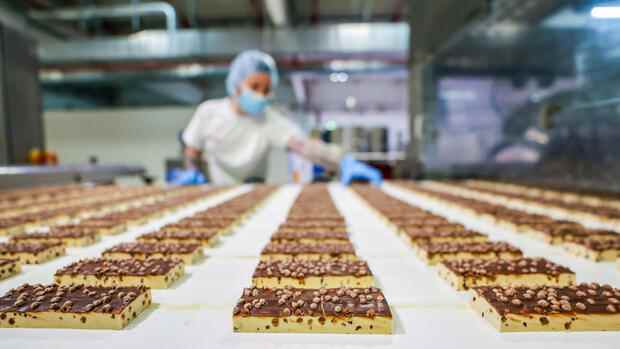Frankfurt The German manufacturers surprisingly raised their prices in August to an unprecedented extent due to the enormously high oil, gas and electricity costs. Producer prices rose by an average of 45.8 percent compared to the same month last year, as the Federal Statistical Office announced on Tuesday.
This is the highest increase since statistics began in 1949. This far exceeded the previous record value of 37.2 percent that was reached in July. Economists surveyed by the Reuters news agency had expected a drop to 37.1 percent in August.
Economists were surprised by the numbers. “An unbelievable price hammer,” commented LBBW economist Jens-Oliver Niklasch on the development. “None of this bodes well for inflation. It’s here to stay.” Producer prices are considered to be the forerunners for the development of general inflation.
Commerzbank economist Ralph Solveen attributes the increase primarily to a renewed surge in energy prices. These increased by more than 20 percent compared to the previous month, compared to August 2021 by as much as 139 percent. This means that even higher inflation values can be expected for the coming months.
Top jobs of the day
Find the best jobs now and
be notified by email.
In its current monthly report, the Bundesbank assumes that inflation in Germany will “advance into the double-digit range in the next few months”. The Munich Ifo Institute expects that the inflation rate could reach eleven percent in the first quarter of 2023.
The institute’s experts see rising energy prices as the cause. As a rule, these only gradually affect inflation because, for example, electricity and gas prices for households are only adjusted over time. This often happens at the beginning of the year. This year, however, there could be a price surge as early as October if the planned gas surcharge were to be introduced.
In August, the inflation rate in Germany was 7.9 percent. Another argument for a further increase in inflation is that it was recently dampened by the tank discount and the nine-euro ticket. The measures have now expired. Many economists are also expecting double-digit figures for the euro area as a whole.
To stabilize inflation: ECB raises interest rates significantly
The European Central Bank (ECB) is in a difficult position because, for example, it can hardly influence energy prices. From the point of view of most experts, these are mainly due to supply bottlenecks such as the failure of Russian gas supplies.
One danger is that the current surge in prices will push up inflation expectations – giving price developments a strong momentum of their own.
In recent weeks, central bank officials have emphasized how important it is to maintain credibility in the current situation. “If citizens and companies no longer believe that the central bank will be able to reduce inflation within a year and a half or two, then the situation becomes very complicated because second-round effects occur immediately,” said ECB Vice President Luis de Guindos.
A warning signal, for example, is that the inflation expectations of private households in Germany as determined by the Bundesbank have risen significantly. In August, these were 7.6 percent for the next twelve months. This is the highest value since the survey began in 2019. The average inflation expected over the next five years rose slightly to 5.6 percent. It has thus exceeded the five percent mark for the fifth time in a row.
In order to stabilize inflation expectations in the euro area in particular, the ECB recently raised key interest rates significantly. It increased this by 0.5 percentage points in July and by a further 0.75 percentage points in early September. The key interest rate is currently 1.25 percent. The interest that banks get for their deposits at the ECB is listed at 0.75 percent. Economists are also expecting further upward steps in the coming months.
At her press conference after the Council meeting in September, ECB President Christine Lagarde spoke explicitly of “several hikes” still to come. She didn’t want to specify exactly how many of the following sessions there were to be further steps up, but put a number from one to four in the room.
The US investment bank Goldman Sachs expects further increases of 0.75 percentage points in October this year, half a percentage point in December and a quarter percentage point in February next year. However, whether this will happen depends heavily on how inflation and the economy develop.
The drastic increase in gas prices increases inflation. At the same time, it should slow down the economy significantly. Many economists are now expecting a recession in Germany for next year – which could dampen price pressure again in the medium term.
Energy is the price driver
Commerzbank economist Solveen also sees positive aspects in the current figures on producer prices. Apart from energy, the price dynamics have continued to decrease.
Above all, the prices for intermediate goods hardly changed on average compared to July, after they had long been the main drivers of the rise in producer prices alongside energy prices.
“It is noticeable here that many raw material prices have stopped rising or even fallen,” says Solveen. “This gives hope that consumer prices will also peak in a few months.”
More: For many Germans, the dream of owning their own home is over
